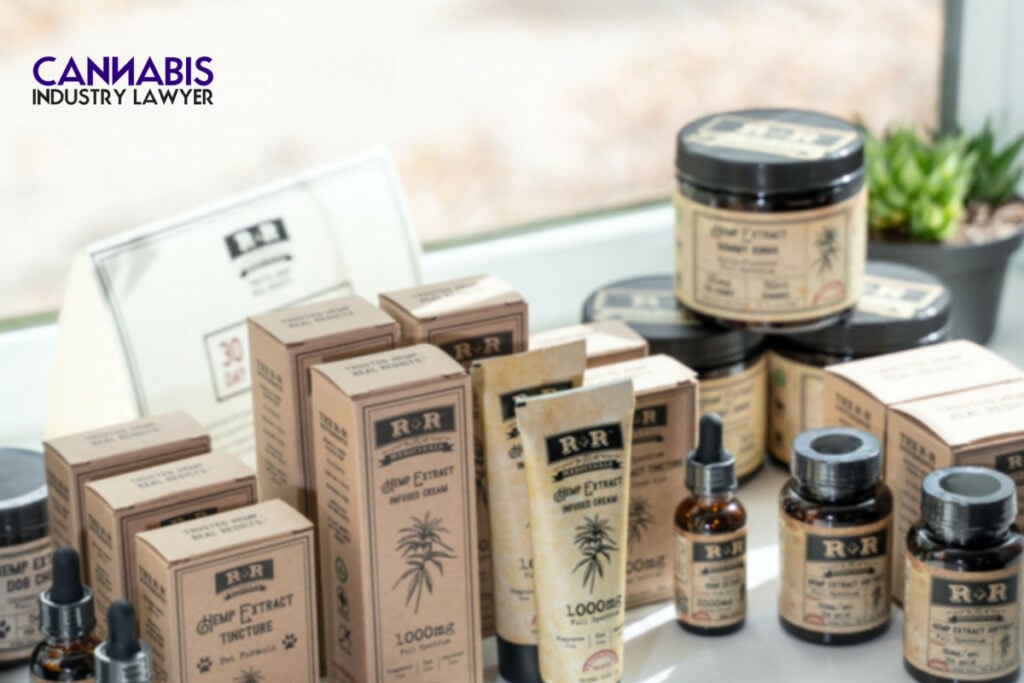
A cannabis trademark lawyer can explain the complex and convoluted world of trademarks in the cannabis and hemp industries. Many cannabis business owners are confused if they qualify for trademark protection because the medical marijuana, hemp, and CBD markets are still relatively young.
The 2018 Farm Bill clarified the legal distinction between hemp and marijuana, as well as the status of commonly used cannabinoids and derivatives like CBD.
As a result, favorable developments in hemp-based trademarks have emerged, as detailed in an Examination Guide published by the United States Patent and Trademark Office (“USPTO”) in May of 2019.
The basics of trademarks, for cannabis or any brands, are outlined here, with an emphasis on cannabis and hemp products at the federal and state levels.
What is a trademark?
A trademark, or a service mark, refers to any phrase, symbol, product name, device, color, aroma, or design that is used to distinguish goods or services from those offered by other companies or sellers in the market.
Trademarks safeguard company owners and their trademarks from being duplicated, as well as ensuring that their products are not used without their consent.
Consumers can make educated purchasing decisions about quality and safety thanks to trademarks, which help differentiate one product from another.
After federally registering the mark with the USPTO or a qualifying state registry, business owners can obtain “trademark rights” by lawfully utilizing the mark on their products.
What makes a trademark the strongest?
Simply stated, the more generic your trademark is, the more likely it is to be challenged by others.
You should avoid using terminology like “green,” “kush,” “cannabis,” “420,” “THC,” “Mary Jane,” and “weed” in the cannabis sector because they are overused.
The stronger your trademark is, the better. Distinctive marks are regarded strong since they are the most difficult to challenge.
Examples of Categories of Trademarks
- Fanciful. Because they are created solely to serve as a trademark, fanciful trademarks are usually the most unique and difficult to challenge.
Leafly and THCHEESE are two examples of fanciful trademarks.
- Arbitrary. Arbitrary trademarks have their own identity. These strong marks are made up of a common word that has nothing to do with the product or service for which the trademark is being utilized.
Level Blends and ROAM are two examples.
- Suggestive. Suggestive marks are used to indicate a feature of a product or service. Because it frequently alludes at the product or service, this form of logo is useful for marketing and advertising.
Seven Point, Re-Leaf, and Royal Highness, for example.
- Descriptive. Adjectives that characterize a product or service are commonly used as descriptive marks. This covers words with a geographic origin, surnames, and alternate spellings.
THC Design, Humboldt Green, and Los Angeles Chronic are examples of this type.
- Generic. Generic terms are used to represent a category or type of goods or service, and they are never protected as trademarks.
Denver Dispensary and Smoke Shop are two examples of this sort.
What are the weakest trademarks?
The weakest forms of trademarks are descriptive and generic.
Because these types are less distinctive, they are easier to challenge for being able to provide protection to your business, but they are still widely used in the cannabis industry.
Federal cannabis trademarks
Marijuana is a controlled substance under the Controlled Substances Act (“CSA”), therefore  selling, purchasing, or using it is unlawful at the federal level, even if it is legal in your city or state.
selling, purchasing, or using it is unlawful at the federal level, even if it is legal in your city or state.
As a result, any name, product, or other asset that violates the law will be denied trademark registration by the USPTO.
“The fact that the supply of a product or service may be permissible within a state is immaterial to the matter of federal registration when it is prohibited under federal law,” according to the Trademark Manual of Examining Procedure.
Any trademarks that cover cannabis or its byproducts will continue to be refused as long as cannabis is prohibited under the CSA.
With the exclusion of dietary supplements, foods, beverages, and pet treats, hemp-derived goods and/or CBD products, as well as ancillary products or services, may be eligible for trademark registration if they meet the CSA’s 0.3 percent THC requirement for hemp.
Also, the USPTO may consider trademark applications for consulting services or commodities that are not directly related to cannabis, such as computer software, educational platforms, and brand apparel.
State cannabis trademarks
State protection may be available for cannabis products, goods, and services that do not fulfill the USPTO trademark registration criteria.
Many of your business’ items may be eligible for state trademark registration through an applicable registry if your company operates in one of these states.
While your state’s cannabis trademark authority is confined to the state’s geographical borders, this is a significant improvement above common law rights in terms of protection.
Businesses have a variety of problems when it comes to trademark registration for cannabis products, but it is vital to take the required procedures to protect your brand and maintain quality and safety.
Consult a qualified cannabis or trademark attorney for more information and advice.





